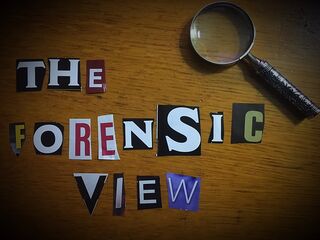Environment
Outside the Forensic Box: Science, Language, and Thought
How we express ideas can change eyewitness and scientific interpretations.
Posted November 19, 2021 Reviewed by Ekua Hagan
Key points
- Human psychology plays a significant role in scientific observation and interpretation.
- The effect of psychological factors on science can be mediated through the use of written rather than spoken language.
- Written scientific accounts may allow for more in-depth analysis and accurate conclusions than the same material presented in spoken form.

The Forensic View blog at Psychology Today obviously deals mainly with forensic issues, including the complex processes of eyewitness cognition. However, we often apply these ideas elsewhere as well. There is continuity in the nervous system; the same principles apply in many areas of psychology, providing new and important sources of explanation across the field, especially in the cognitive and perceptual arenas. As we saw in our last Forensic View, this is true of eyewitness processes in the sciences as well as in the criminal justice system.
In that post, we began with the fact that any eyewitness account is a fusion of the actual scene with the psychological proclivities of the witness, the observer. Scientists, with the same kinds of nervous systems as everybody else, may be subject to the same vagaries; and in that post, we demonstrated this fact in several historical examples, and in a new study of more than historical interest.
What we discovered was that in the critically important area of climate change, prior beliefs about the subject can significantly bias our interpretations of environmental observations. Using paired pictures of geographic features in which either ice had receded or water had deepened, we asked respondents about the sources of these differences.
Now, although climate change could certainly have been the cause of any of these changes, so could changing seasons, ephemeral atmospheric conditions, winds, tides, or many other things. Yet with no information beyond the raw pictures themselves, those who viewed climate change as existentially dangerous to the Earth were significantly more likely to believe these differences to be the direct result of climate change, rather than of the myriad other factors which produce such differences on a seasonal or even shorter cyclical basis.
Climate change is obviously real and of the greatest importance. Widespread scientific consensus has emerged on the potentially existential hazards of climate change, as the many natural climate changes of this planet, in the distant past, have repeatedly been demonstrated in extraordinary and frightening detail.
However, a number of climate-change predictions have not been borne out, and there are continual challenges to current concepts of climate change. These facts render it absolutely essential that observations and interpretations in this area be as completely objective as possible. Yet we see here clear evidence that our prior beliefs can bias our interpretations of relatively straightforward observations (less ice, more water). Is there a way to remedy this problem?
Language and the Visual Interpretation of Information
In a number of outstanding studies which were foundational for modern forensic psychology, Loftus (e.g., Loftus & Palmer, 1974) demonstrated the importance of language to the interpretation of visual information.
In one of her best-known studies, a film was shown of a car bumping into another car. When respondents were asked how fast the cars were going when they “hit” each other, or whether the respondents saw broken glass (there wasn’t any), people generally gave reasonable speed estimates and correctly reported the absence of broken glass.
However, when the language was changed to the cars having “smashed” into each other, respondents gave much higher estimates of speed, together with a significantly enhanced probability of false reportage of the nonexistent broken glass.
So, in the field of criminal justice, we see the biasing effects of language on eyewitness interpretation.
In the field of science, might language modality bias “eyewitness accounts” of observations in the critical realm of climate change?
In our studies (e.g., Sharps et al., 2021), we provided information about climate change to respondents who judged our pairs of geographic scenes with regard to climate change. The same information was provided to all. This information per se did not influence the attribution of the given scene differences to climate change, but the modality of presentation did.
When the material was presented by means of the spoken word, as it might be on a radio or podcast presentation, or in a report read by a newscaster on television, attribution of the scene differences to climate change, even though there was no evidence that this was the case, tended to be strong. However, when the information was presented in written form, or in written form with spoken accompaniment, there was significantly less unwarranted attribution of the observed differences to climate change.
Why would this be the case? The human brain typically places a higher priority on visual than on auditory processing, and written text gives rise to visual processing that spoken material does not. Relevant ideas are still present within our visual field for additional processing as we continue to read, so in general, we may say that the processing of written material may yield a greater depth of processing (e.g., Craik & Lockhart, 1972), contributing to a more thorough consideration of the given issue. In the present case, that thorough consideration gave rise to a better understanding that given environmental differences might have arisen from other than global causes.
Many cognitive factors influence observation and interpretation in the criminal justice realm (e.g., Sharps, 2022). Here we see similar cognitive influences in the realm of important scientific issues. Prior beliefs in climate change were shown to bias respondents to attribute environmental differences to that source, even in the absence of evidence; but the simple use of written rather than spoken information, even though that information was the same across modality, reduced this bias. If we are aware of biasing influences, in the scientific as well as the forensic realm, we can mediate those influences through such simple psychological technologies as the use of the most powerful language modalities.
The strength of people’s belief in climate change altered their interpretation of scientific data, but the provision of information in the right modality produced the opposite effect. These findings show that a solid understanding of cognitive psychology can be of great benefit to enhanced accuracy in critical areas of science and that much of our knowledge of forensic cognitive science can be productively applied in areas, such as the physical sciences, which typically lie outside of the forensic “box.”
References
Craik, F.I.M., & Lockhart, R.S. (1972). Levels of processing: A framework for memory research. Journal of Verbal Learning and Verbal Behavior, 11, 671-684.
Loftus, E.F., & Palmer, J.C. (1974). Reconstruction of automobile destruction: an example of the interaction between language and memory. Journal of Verbal Learning and Verbal Behavior, 13, 585-589.
Sharps, M.J. (2022). Processing under pressure: Stress, memory, and decision-making in law enforcement (3rd ed.). Flushing, NY: Looseleaf Law.
Sharps, M.J., Nagra, S.K., Paulsen, A.D., Moreno, J.C., Mortensen, S.R., Folmer, T.L., Jones, C.J., & Price-Sharps, J.L. The influence of information on environmental decision-making: Modes of delivery and depth of processing. Psychonomic Society, Virtual, November 5, 2021.




